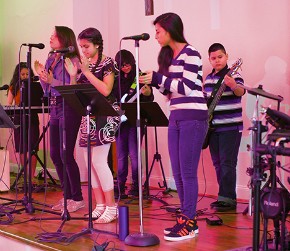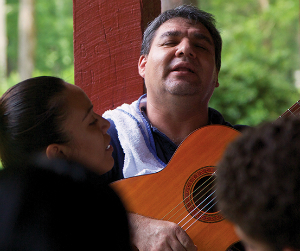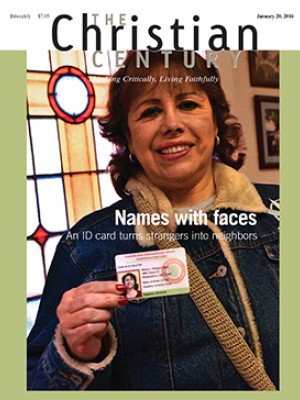Las bandas niños: A Latino church empowers young musicians

It’s a little before eight on a Tuesday night, and José Guillermo Salamea thinks his band of musicians, known as La Banda Revelation, might need a little pick-me-up. He stops the group in the middle of “Haz Llover” (“Make It Rain”), a confessional chorus written by Brazilian pastor and songwriter Fernandinho (who is so well known that, like a soccer star, he goes by his first name only). It’s a sparse tune, and Salamea wants to make sure it doesn’t drag.
“Niños, necesitan café?” he asks with a bemused smile, clapping out the rhythm. “Toca mas rápido!” (“Kids, do you need coffee? Play faster!”)
Salamea is music minister at Iglesia Hispana Emanuel in Durham, North Carolina, and he has been mentoring three of these band members for years. He taught Rosa Ramirez, 16, to sing, Andrea Hernandez, 16, to play guitar, and Jorge Duerte, 15, to play the drums. Salamea is teaching some 40 members of this congregation to play an instrument—everything from classical guitar to trumpet.
Read our latest issue or browse back issues.
Iglesia Emanuel, a decade-old mission congregation of the Presbyterian Church (U.S.A.), began with six Guatemalans and a progressive pastor from the Dominican Republic. It is now 100 strong, with members coming from various countries in Central and South America. One quarter of its members participate in one of the church’s five worship teams. Emanuel has built strong ministries of social service and worship by paying attention to what its neighbors need.
“The idea was to make the church more visible,” says pastor Julio Ramirez-Eve. “The majority of the people coming here, they don’t have any money. The majority of the people, they’re living day by day—but still, they want their children to learn something.”
Since 2006, Salamea has taught more than 200 musicians. (Hernandez came to the church six years ago because she saw a sign outside advertising free music lessons.) A Wednesday night food pantry serves a hot meal and distributes groceries to 40 local families each week. Emanuel’s soccer program fields a youth team and a summer camp.
“If you have a goal to grow the church,” says Salamea, “you need to work with the families.”
At the Tuesday night rehearsal, Salamea has trouble keeping the teens focused on “Haz Llover” and its tempo. Hernandez, who has a keen sense of pitch, is fiddling with her tuning pegs. When Salamea mentions coffee, Ramirez turns to co-lead singer Gisell Garcia, 15, and says, “Did you know if you go to Starbucks, you can have anything free on your birthday?”
Salamea was recruited as music leader by David Keck, former pastor of Emanuel’s original host church, Northgate Presbyterian. The church was in a heavily Hispanic neighborhood, and Salamea was taking a course in English as a second language offered by the congregation. Ramirez became one of Salamea’s first students, and now she leads worship with Revelation at least once a month and studies voice at the Durham School of the Arts.
Salamea interrupts Ramirez’s thoughts of pumpkin spice lattes by playing Fernandinho’s melody on his electric piano. Skilled on all the rock instruments plus brass, Salamea himself fills empty spots in the various Emanuel bands until a student is ready to take his place. Duerte taps out a steady beat on his high-hat but then slows down when the piano goes silent as Salamea makes way for the girls’ voices. The teacher halts them again.
“Tempo!” he says, clapping it out again. “That beat!”
He leads the band back through the intro, and this time they keep up the rhythm when the singers enter. “My heart is thirsty . . . make it rain.”
Salamea signals Duerte for a drum fill into a repeat of the song’s first and only verse. When they reach the chorus, Garcia struggles to find her alto harmony. Salamea points to his ear, and she retreats to the safety of the melody. Salamea’s commitment to skill-building is typical of today’s immigrant congregations.
Latino church music is influenced by Pentecostalism, with its emphasis on festive, dynamic music. Yet many churches lack the budget to hire even one professional musician, much less a whole band. But Pentecostalism also emphasizes bringing laypeople into leadership.
“Watching someone grow into their gift gave everyone—not just the musician—a sense of accomplishment and would add to our joy and praise,” says church historian Zaida Maldonado Pérez, who grew up with the rise of Latin American contemporary worship music. “Sometimes the music was off tune or out of rhythm, but always joyful.”
These two objectives—dynamic music and leadership learned by doing—can sometimes be at odds. But Salamea and Emanuel have slowly enhanced the skills of these volunteer musicians, who are creating powerful music.
“I feel proud because it’s a really good church and a lot of people enjoy our music,” says Flor Rosas, 12, who has played piano in La Banda Niños de Diós (Children of God) for three years. “It feels good, because it feels like you’re singing songs to God.” Rosas wishes Salamea wouldn’t choose songs that force her to play more difficult patterns and stretch her fingers. But Emanuel’s music academy has given her the skills to play in a band at her middle school as well.
Eleven-year-old Christopher Vaquevano has been playing drums in La Banda Renacér (Rebirth) for almost three years, and he recently started learning trumpet. “It’s pretty fun to know that I’m playing for God, and people like how our band plays,” he says.
Ramirez sings in her high school choir and takes private voice lessons. She says music has become one of the most important and time-consuming parts of her life. “Singing has kind of always been there,” she says. “I guess I could call it a friend—something I go to when I’m not feeling that great.”
When it began, Emanuel’s Academia Música was the only free, church-based music school for Spanish speakers in the Raleigh-Durham area. Since then, other churches have followed suit, and the parachurch worship-training networks Instituto CanZion and Staff 24/7 have opened sites nearby.
“We decided to start training people who want to worship the Lord,” said Ricardo Correa, pastor of Centro de Alabanza Naciones Unidos (United Nations Worship Center), across town from Emanuel. “With the urgency of the need that the church has, we can’t afford to take three or four years.”
Emanuel sees itself not only training volunteers to lead worship but also sharing a gift that can build self-esteem. “Many of the children are doing bad in school because they come from another country with another language,” says pastor Ramirez-Eve. “We try to provide an opportunity for the children to feel success.
“It’s the culture,” he says. “People enjoy the music. People dream to have a popular musician in the family. It’s the same with soccer: everybody wants to be Messi or Ronaldo. In the music, everybody wants to be Selena or Chayanne. Those are the dreams for many families.”
Over the past couple of decades, Latin American worship music has made celebrities out of singers like Fernandinho and Marcos Witt, the five-time Grammy winner behind Instituto CanZion’s 80 schools in 21 countries. Some of Salamea’s students have found modest success as musicians in dance clubs in the region.
“They are making money,” he says with a smile. But his own congregation needed to be persuaded to invite the young musicians onto their stage.
 |
After Salamea had been giving lessons for about six years, church members started asking why their small staff was giving so much time and energy to people outside the fold. Salamea and Ramirez-Eve resisted charging tuition for the lessons, though Emanuel could have used the money. They believed that if they could show the congregants how the young musicians could enhance their worship, they might gain more support.
But the core of the church was made up of charismatic Presbyterians from Guatemala, and many of the music students were Mexican Catholics. There was some theological tension between the two groups over issues of women in leadership and the gifts of the Spirit. Ramirez-Eve urged the church to offer hospitality and see how people’s theological beliefs might change over time.
Ramirez-Eve and Salamea created a special Wednesday night service to showcase the academy’s budding worship bands. “It was not easy for [the congregation] to open that space on Sundays,” says Ramirez-Eve. Salamea said the Wednesday night service was “the bridge we created in order to bring [students] into the church.”
Eventually, the original core of Guatemalan Presbyterians left the church, but Emanuel’s young musicians have never looked back. For worship, three youth bands rotate with the adults in La Banda Vino Nuevo (New Wine) and Emanuel’s in-house mariachi band. Over the past couple of years, Emanuel has even begun requiring music students to work toward joining a worship team.
“I’m not as good as my father with using words,” said Ramirez, daughter of the pastor. “Through singing I can encourage people and influence people to follow God’s word, and worship and let him into their lives. When they see me and my band, since we’re pretty young, that we’re so touched by the Spirit, and that we love to do this as an everyday kind of thing, it inspires people so that they can really see what God can do.”
“I think they see that it works,” comments Salamea.
The tempo troubles and Starbucks distractions have slowed down La Banda Revelation’s rehearsal. They’ve only gotten through three of their seven songs for Sunday by the time Duerte deftly starts the polka-like rhythm of “Da Me La Mano” (“Give Me Your Hand”), a Mexican ranchera tune that Emanuel sings every week during the passing of the peace. Bassist Kiara Servin, at 14 the youngest and least experienced member of the band, isn’t quite ready for the quick transition.
“Todo esto va junto!” Salamea urges. “De la primera al fin. Together! Together!” (“All these songs go together, from the beginning to the end”).
“It’s almost my bedtime,” yawns Garcia.
“C’mon, guys,” says Ramirez. “Let’s hurry!”
Salamea is satisfied they’ll get it on the next run-through, so they move on to “Jesus at the Center,” a gospel ballad by Israel Houghton, worship leader at Joel Osteen’s Lakewood Church in Houston. The singers have been practicing with a recording of the Spanish version—and complaining about it.
“It’s so weird to say, ‘El centro de todo es Jesús,’” Ramirez says.
“Why don’t we just keep it in English?” asks Servin. Garcia concurs.
“No puedes,” says Salamea. (“You can’t.”) Church is a sanctuary for immigrants, one place they can be themselves, in their own language. Salamea is concerned not for the kids’ comfort but for their parents.
“It doesn’t make sense—the syllables,” says Garcia. “Maybe if we had learned it this way first.”
“Guillermo, it’s 8:10,” says Ramirez. “Can we do this song another time? I know you want to do it, but we just learned it.”
“It’s going to take a lot of time, and we need to practice these other songs,” says Garcia, who attends a year-round school. “I have homework.”
“Yeah, we have homework,” says Servin.
“You’re not in school!” says Ramirez, laughing.
It doesn’t matter; Salamea is convinced. They will tackle Israel Houghton’s song another day. Instead, they plow through “Solo Cristo,” by Hillsong Español, and Witt’s “Gracias,” with Garcia nailing the same sort of low harmony she missed in the earlier song.
Just before nine, the band runs cleanly through their whole set. By Sunday morning, the tempo troubles are no more. Fifty-six-year-old Maria Telles, who used to sing these sorts of dramatic pop songs as a younger Catholic in Mexico, raises both arms as Revelation leads the song “Haz Llover.” Telles’s posture of reception matches the lyrics: “As the deer pants for water . . . flood my heart.”
“I feel like I’m talking to God,” she says later as Garcia translates. “I thank God I have the privilege to sing.”
Just as they practiced, the band shakes the crowd from the mystical encounter of “Haz Llover” and into community. Led by Duerte’s polka beat and Salamea’s bouncy, synthesized accordion melody, they play through “Da Me La Mano” several times as the worshipers scurry to greet as many others as they can.
Revelation saves its best for last. As Garcia and Ramirez spit Witt’s rapid-fire lyrics over a reggaeton groove, they wave their arms and clap their hands to the elusive rhythm. “Oh, oh, oh, oh, oh, oh, oh, let us worship on Mount Zion, the joy of Puerto Rico,” they sing in Spanish. “Pon tu mano arriba!” the congregation sings. Put your hand up! And most of them do.






